Imperfect Characters and Power Imbalances: 'After the Hunt' Screenwriter Nora Garrett Breaks Down the Campus Drama
Ayo Edebiri, Julia Roberts, and Andrew Garfield star in the Luca Guadagnino film about the fallout of allegations raised against a Yale professor.
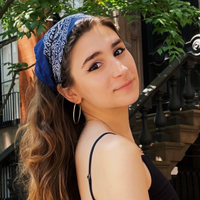
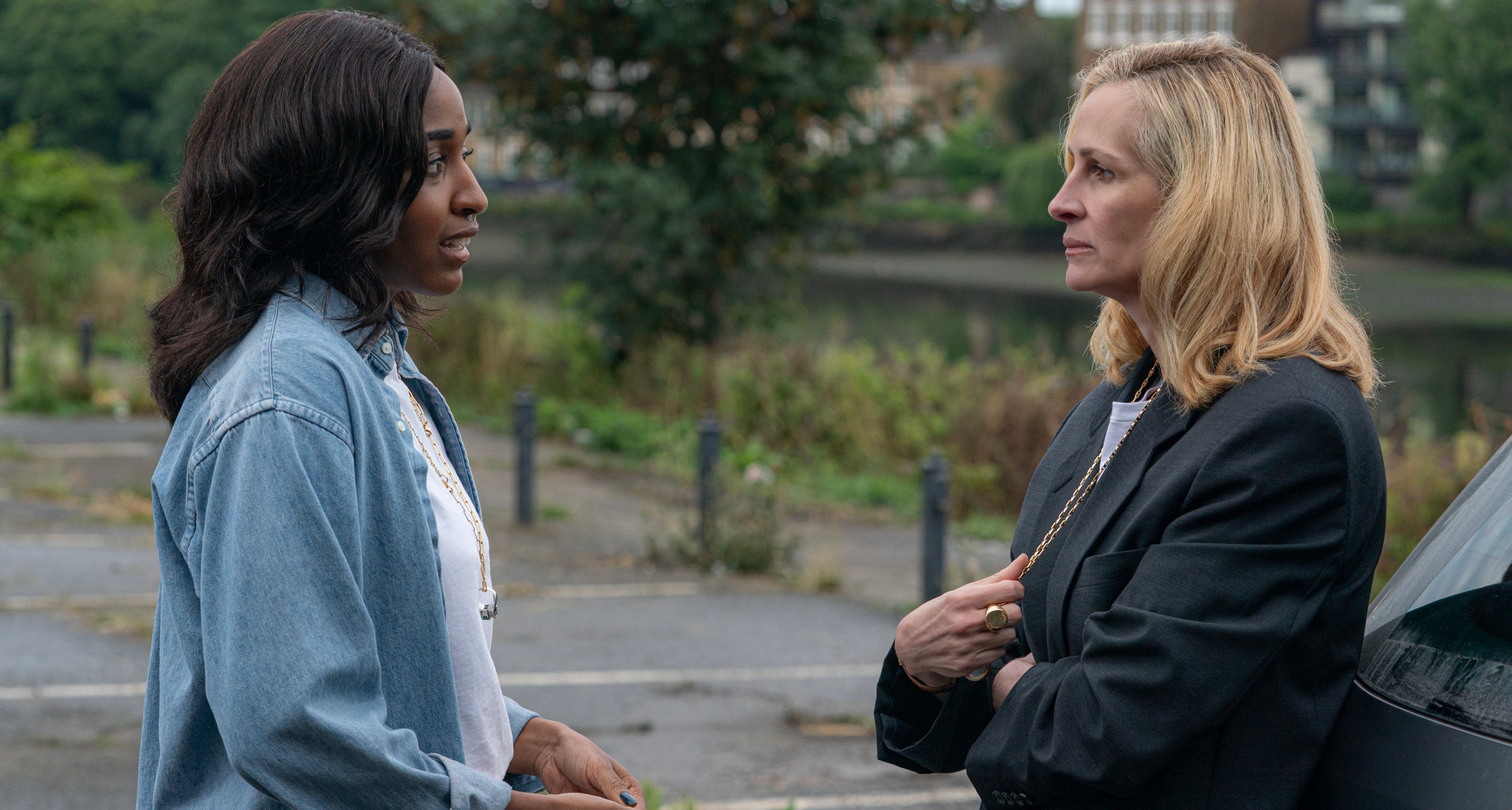
Select the newsletters you’d like to receive. Then, add your email to sign up.
You are now subscribed
Your newsletter sign-up was successful
Want to add more newsletters?

Delivered daily
Marie Claire Daily
Get exclusive access to fashion and beauty trends, hot-off-the-press celebrity news, and more.

Sent weekly on Saturday
Marie Claire Self Checkout
Exclusive access to expert shopping and styling advice from Nikki Ogunnaike, Marie Claire's editor-in-chief.

Once a week
Maire Claire Face Forward
Insider tips and recommendations for skin, hair, makeup, nails and more from Hannah Baxter, Marie Claire's beauty director.

Once a week
Livingetc
Your shortcut to the now and the next in contemporary home decoration, from designing a fashion-forward kitchen to decoding color schemes, and the latest interiors trends.

Delivered Daily
Homes & Gardens
The ultimate interior design resource from the world's leading experts - discover inspiring decorating ideas, color scheming know-how, garden inspiration and shopping expertise.
This story contains references to sexual assault, which may be distressing to some readers. If you or someone you know has been affected, you can call the National Sexual Assault Hotline at 800-656-4673 or visit rainn.org for confidential support.
This story contains spoilers about the entirety of After the Hunt. About a decade ago, it seemed as if conversations around college campus sexual assault had reached a fever pitch. In 2014, the White House published the first report of its kind, “Not Alone,” which included action items and statistics surrounding sexual violence at American universities. In the following months, high-profile cases, like the University of Virginia scandal and the Brock Turner trial at Stanford, received widespread media attention.
#MeToo unfolded just a few years later, bringing more attention to power imbalances. Luca Guadagnino’s latest film, After the Hunt, is set in the wake of these moments, examining how they did or didn’t affect different generations and the shifting currents of power. Written by first-time screenwriter Nora Garrett, the knotty, ‘90s-thriller-esque drama focuses on how Yale epistemological thought professor Alma (Julia Roberts) contends with allegations made by her star PhD student Maggie (Ayo Edebiri) against Hank (Andrew Garfield), her longtime friend and colleague (and competition for tenure).
Garrett, who studied acting and writing at NYU’s Tisch School of the Arts and graduated in 2013, explains to Marie Claire over Zoom that no one real-life or personal incident was the blueprint for After the Hunt, but the cases that unfolded after she left higher education stuck with her. “Those cases very much impacted me—I think in a way that was difficult to quantify at the time,” she says. “Watching them meet the justice system in some way—and the failures of justice that were carried out occasionally—was pretty seismic.”
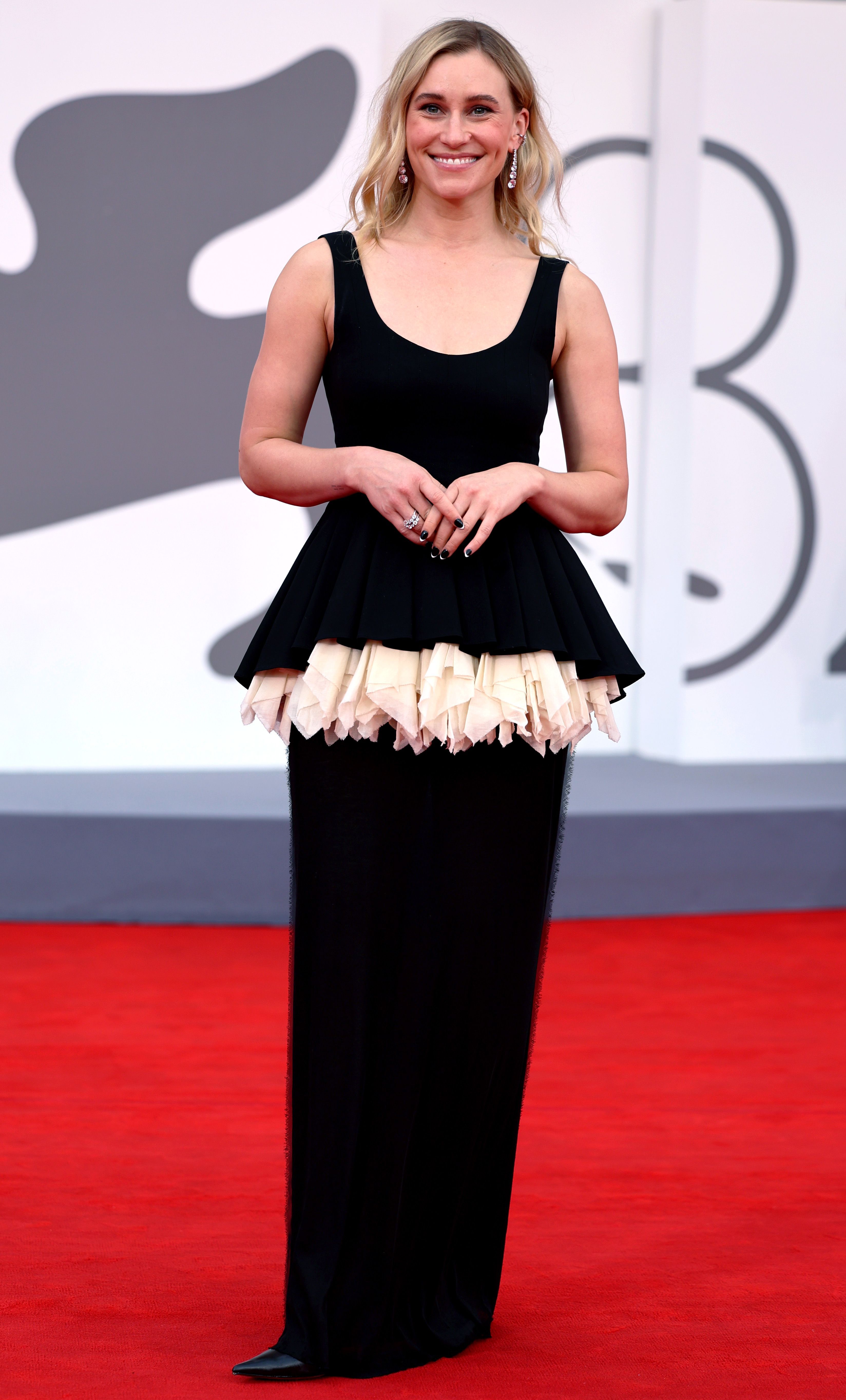
Nora Garrett at the premiere for After the Hunt at the 82nd Venice International Film Festival on August 29.
After struggling to launch an entertainment career, working as a personal assistant to A-listers, and briefly at Meta, Garrett—driven by thoughts of hierarchies, mentors, and success—wrote After the Hunt, which sold in 2022 and attracted Guadagnino in 2023. Setting the story at an Ivy League institution felt all but inevitable, she says, because of the power structures they cast. “There’s a slippery understanding of how much people in power can get away with because there is that worshipful student-professor relationship. I was interested in those multi-layered microcosms that both draw their prestige from an ancient endowment, literally and figuratively, and don't always live up to that.”
And setting it in the ethics department was meant to be both tongue-in-cheek and honed in on one of the film’s central conceits: “They might teach something—the ideas are beautiful—but when it comes to your own life, you might not be able to actually subscribe to those ideas that are so easy to tell other people to subscribe to.”
Ahead of After the Hunt’s October 17 nationwide theatrical debut, Garrett answered all of our lingering questions about the film, from how Guadagnino’s vision changed about the story to why survivor stories matter.
Get exclusive access to fashion and beauty trends, hot-off-the-press celebrity news, and more.
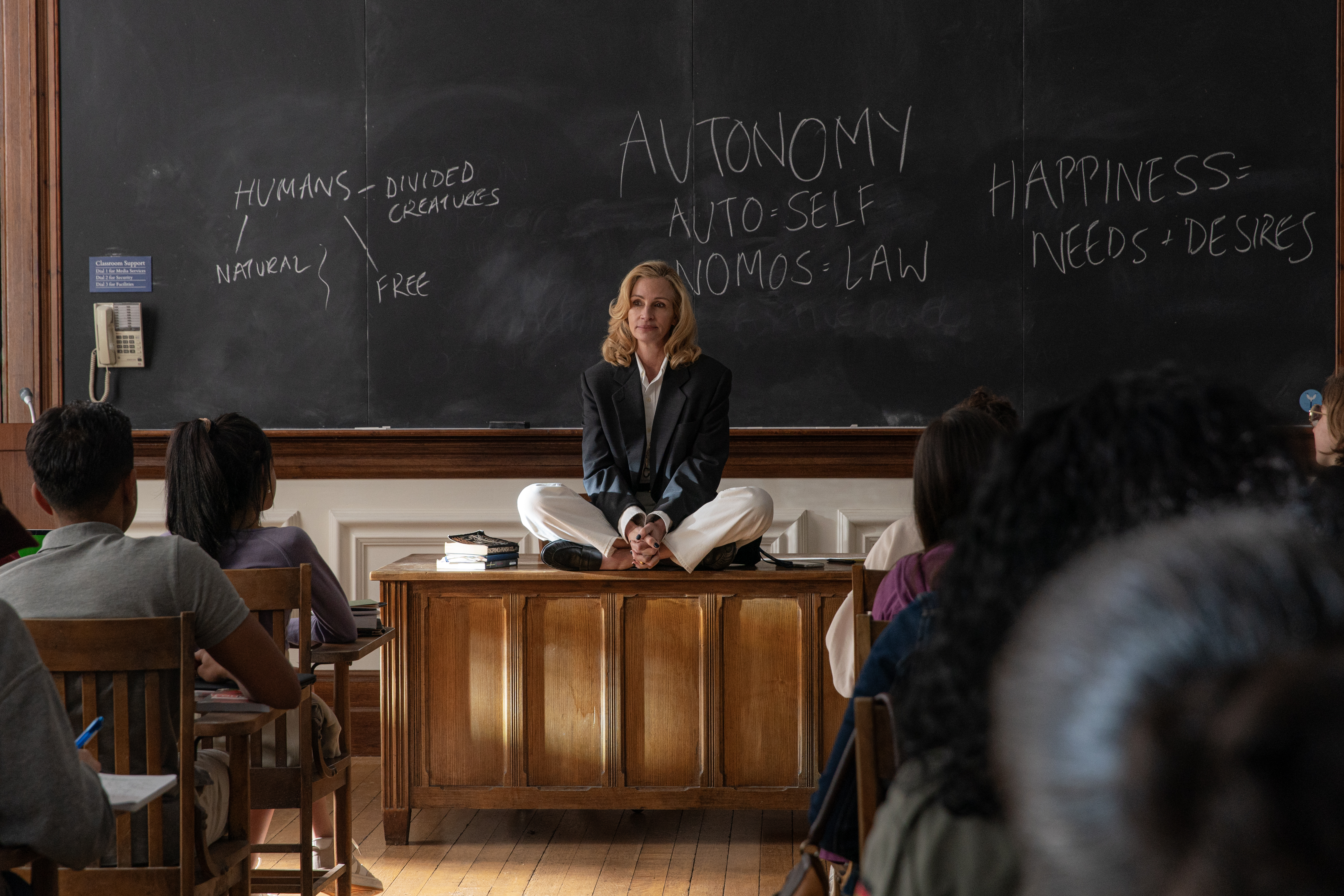
Julia Roberts stars as Alma, a Yale professor of epistemological thought, in After the Hunt.
Marie Claire: Why did you set the movie two years after the #MeToo movement? And what do you think that moment failed to address for both people of Alma’s generation and Maggie’s?
Nora Garrett: The choice to set it in [2019] was more based on wanting to keep the story pre-COVID. But these things—Brock Turner and UVA and the #MeToo movement—all really started occurring when I was in my mid- to late-20s. I had experiences prior that probably would've been very different, had I been able to have the understanding, reckoning, and language that #MeToo really supplied us with, and the horrible and wonderful trove of women’s stories that came out because of that movement. I say wonderful only in the sense that it emboldened a lot of other women to look at each other and feel, There's actually solidarity here, power, and movement here. Before, it felt so isolating and siloed.
We live in a culture in which extremity is preferred, and I think that when these moments occur, there's obviously a lot of attention, but they’re still playing out. And I think that that reckoning will probably have to happen again, but in a different form. I hope that it's given younger generations more language, more understanding, more resources than I certainly had in my early 20s—but I think the idea of total parity still has not been solved.
MC: All of the characters are imperfect. Why did that feel essential?
NG: What was very important was nuance. I have felt personally very frustrated by—and I think a lot of people share this sentiment with the insane pressure and political machinations foisted upon women who do come forward—this idea that there has to be a perfect blueprint for someone who's allowed to have their experience.
Right now, I think we have a really hard time holding two truths in our heads at the same time. We have a really hard time with gray area and nuance, and it's really difficult for us to say or to reckon with:This person was my really good friend and so wonderful to me, and how is it possible that they did this thing to this person? And this person had a completely different experience of them? How do I make those two things make sense?
I’ve received some feedback where people have told me, “I am sure Maggie lied because she lied about plagiarism.” My question to them is always, “Why does that make a one-to-one?” I understand that we're all trying to line up each other's character based on past behavior, but two things can be true even if they seem contradictory.
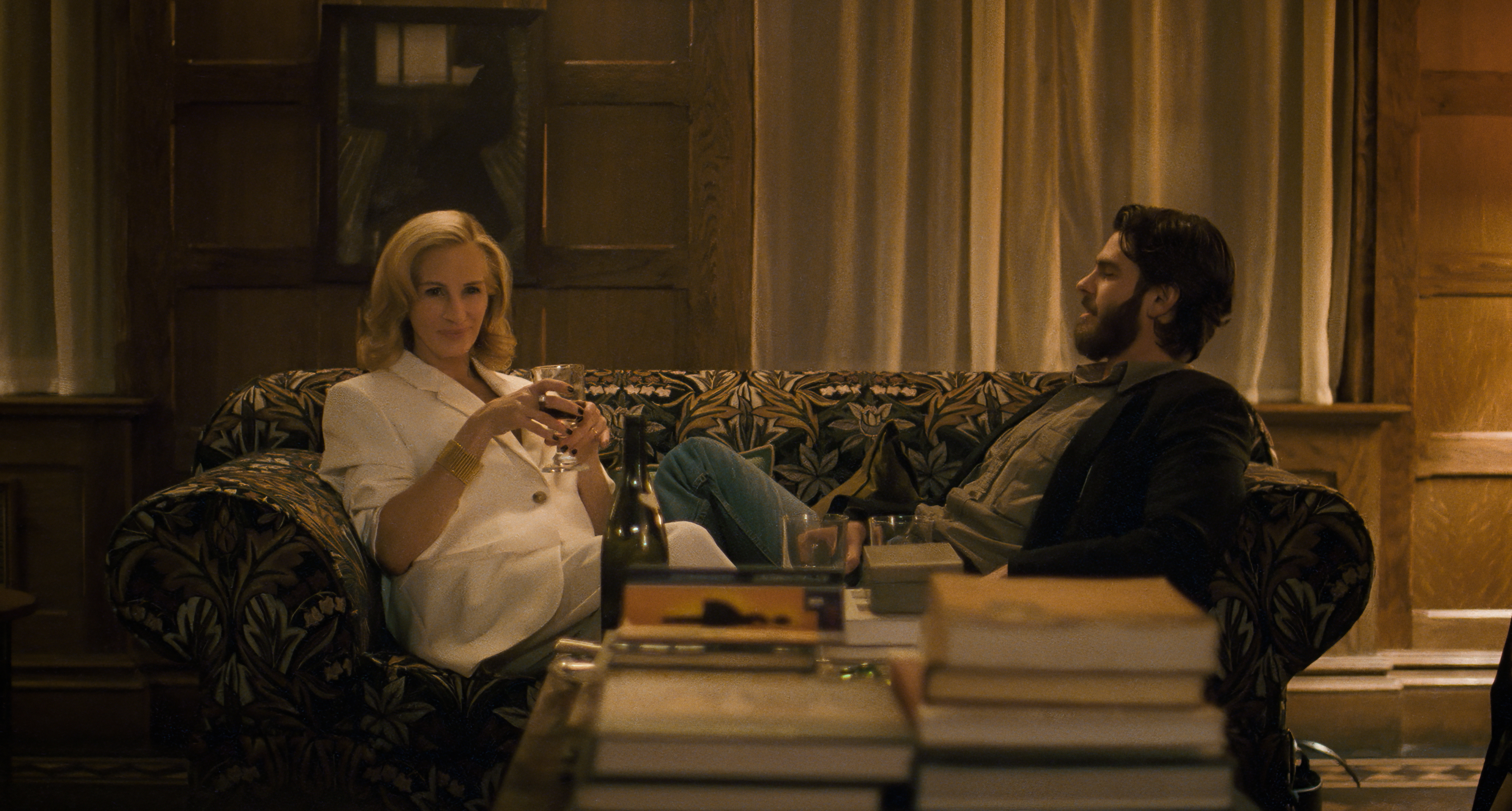
After the Hunt comes one year after Luca Guadagnino released both Challengers and Queer into theaters.
MC: The characters are all powerful in their own way—whether they’re wielding power, coming into it, or losing it. What about that interested you?
NG: I got really fascinated with, What happens to people in power? How do they particularly get that type of power? What about them in particular? It'd be hard to say that we societally are not obsessed with power, and specifically, in capitalism, obsessed with the type of power that comes with a certain type of salary and visibility. It feels like, Once I get that, my identity will be shored up.
That was really where Alma began the narrative: She was waiting for tenure, and once she got that, she'd be unassailable and on the other side of something. It was interesting to have something happen to her that kept her from that.
MC: When you were originally writing the film, were you certain in your belief of what really happened to these characters?
NG: I was—in the same way that Andrew had a very clear narrative for what happened, and Ayo [Edebiri] had a very clear narrative for what happened. I don't know if all of our narratives agree, and I think that's the beauty of how this film was constructed under Luca [Guadagino]'s leadership.
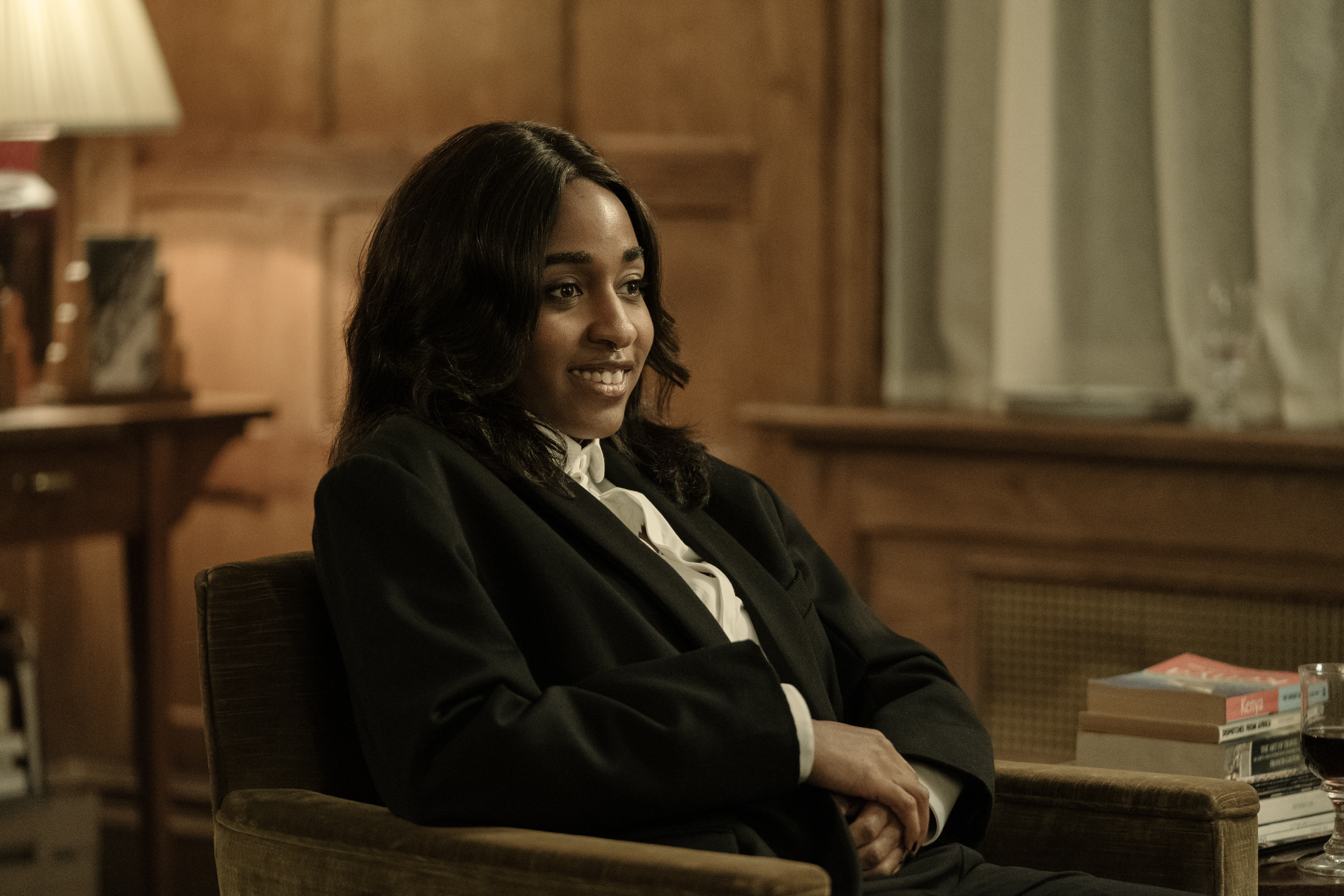
"Two things can be true even if they seem contradictory," Garrett says of Maggie (Ayo Edebiri) being both a survivor of a traumatic assault and plagarizing her thesis.
MC: When the script was picked up and Luca Guadagnino came on board, a lot was added. How did working with him help shape the final direction of the story?
NG: Luca expanded every metaphorical element of the script and definitely pulled out more of the tension between the characters—different identity markers—and within each character, wanted to expand how many dichotomies they had, how many different power structures they were maybe operating within or felt as if they were operating without.
In my original script, Maggie was not of any particular race. When Ayo came on board, it was integral to making the text feel like something relevant and honest to having her voice in combination with Luca's on her character. And then my original ending was much more black and white. You had much more of a sense of who did what in the original draft and had much more of a sense of a very clear moral arc. Luca was more interested in the ambiguity of what happened that night, extending all the way through to the end of the film.
MC: I understand Luca wanted to emphasize the generational differences between Alma and Maggie, but I’m curious if Alma’s affair was always in the screenplay?
NG: That was always part of the story. The affair, to me, was important because it felt like Alma and Frederick's relationship was one of such patient, true love. And Alma is the type of character that could not live without testing that—not maybe on a conscious, manipulative level, but just in a sense of feeling, I don't deserve that. There's a kinship with them because of their similarities in the way that they turn over thought and the way that they exist in the life of the mind and in the sort of competitive jockeying atmosphere of higher education. I wanted that affection to be real and complicated because I think that if it's not real, then hearing what he did or didn't do doesn't have the same amount of potency and necessity for introspection.
In terms of the generational differences, that was something Luca was very passionate about. He was really wary of this notion that we were going to come down very hard on one generation versus the other. He wanted the very humane, compassionate perspective that everyone is a product of their particular social moment and that it's really difficult to divorce your identity from everything you were taught and used to navigate.
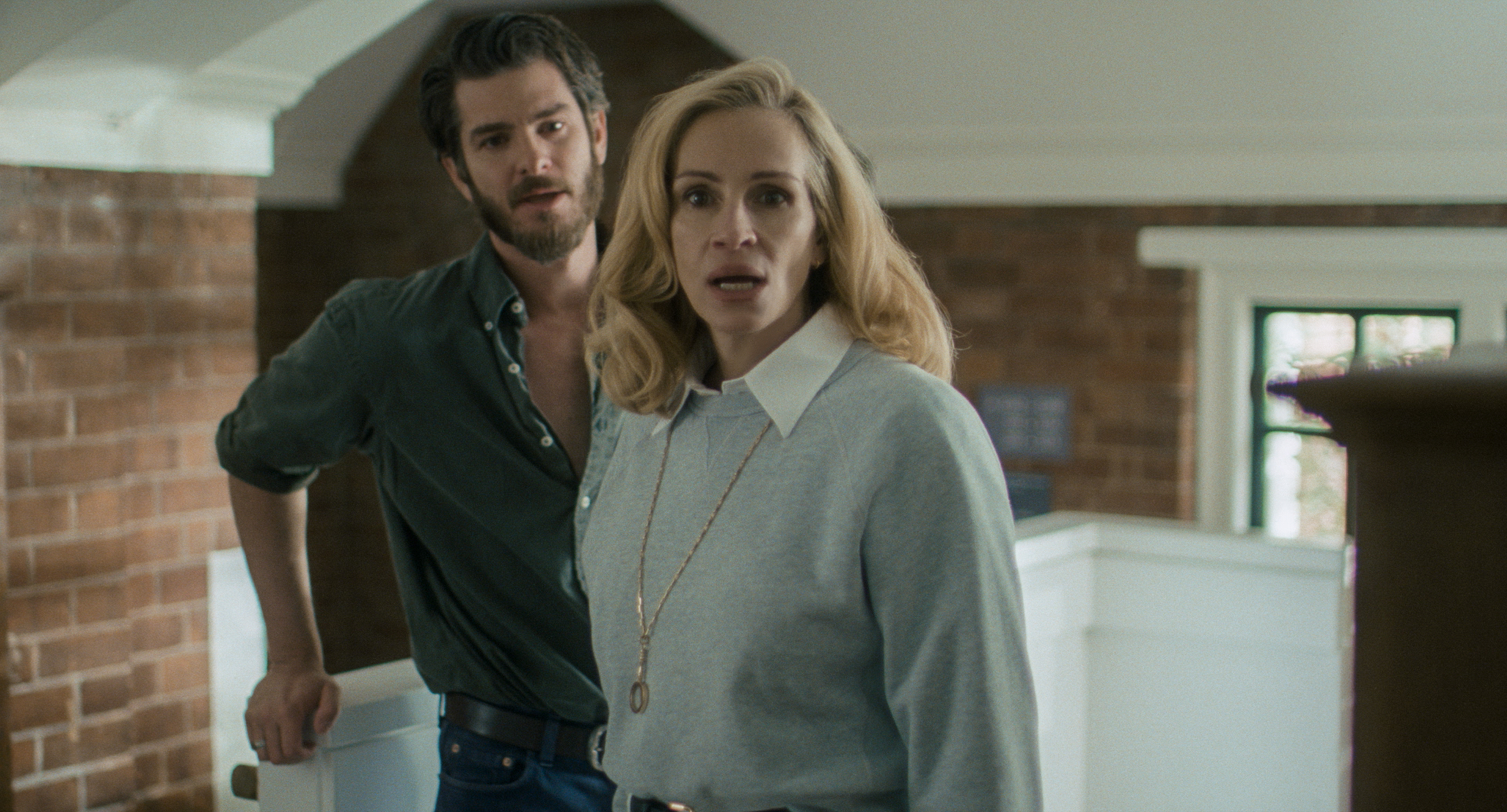
Garrett explains that Andrew Garfield, who plays Hank, "had to have his own version of events in order to get behind his character's trajectory."
MC: Was there a particular scene that was difficult to write, either structurally or emotionally?
NG: The moment of Maggie's confession was really, really difficult to write, and that was something where I both wanted to be very protective of that experience and wanted to be very faithful to as much as I could in this imagined experience for Maggie. Those are moments as a writer where you hope that the empathetic experience is one of understanding, as opposed to a feeling of, That was not translated correctly.
MC: Was it just as difficult to write the moment about Alma’s confession to Frederick in the hospital, given all of the nuances there?
NG: Something that made the hospital conversation slightly easier was writing from Frederick's perspective. This was a scene that took a lot of shaping with Luca's involvement. It was very important that even if Alma, at the end of the film, is still caught in this feeling of self-denial, Frederick is there very lovingly holding out a different option and a different narrative that could be possible for her that he potentially sees as what really happened.
MC: There have been a lot of reactions from people interpreting Maggie and Alma as opposing one another, but what did you intend their different ideologies and experiences—especially one of maybe self-acceptance and self-denial—to represent?
NG: It was never my intention to have them feel like opposing figures. I mean, obviously, they are characters in conflict with one another; there were expectations that were horribly disappointed on Maggie's end, and Alma, in that initial moment, was caught in her self-denial. The thing about self-denial is that when someone else is in front of you, saying the thing that would cause you to look at that denialism and reevaluate it, it can be incredibly difficult to be in that present moment with them because of how it hits you and because of what that would mean for the life and narrative that you've constructed for 50-some-odd years.
It's not about pitting women against each other. I don't think that that is something that I feel confident or comfortable saying is part of the narrative. My hope is that the film helps the audience members understand why these two women would feel the way they do about each other because of their own intrinsic makeup and emotional foibles and imperfections.
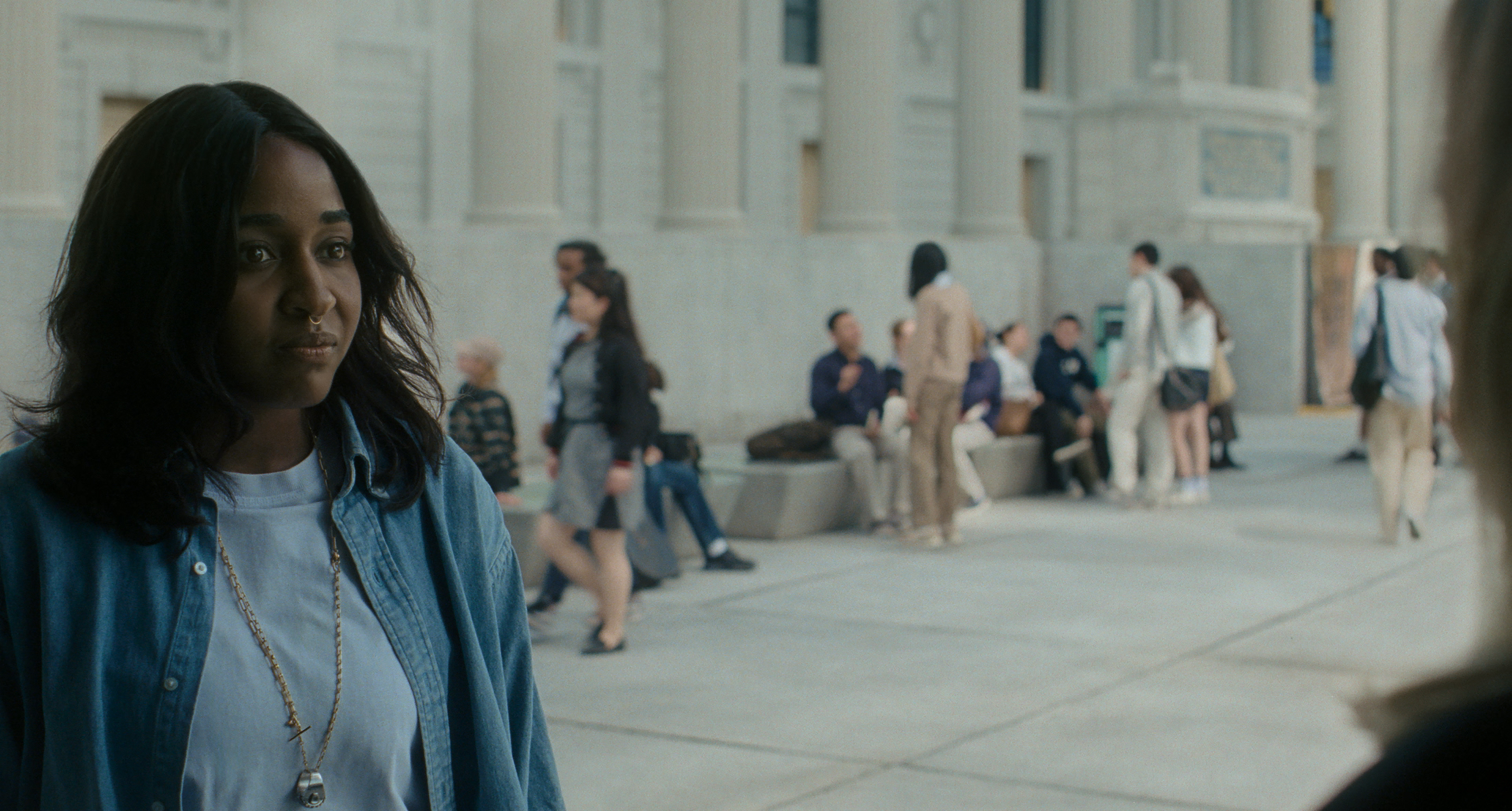
Garrett describes writing Maggie's confession to Alma as a moment "as a writer where you hope that the empathetic experience is one of understanding, as opposed to a feeling of, That was not translated correctly."
MC: It’s not such a one-to-one of progress because everyone is coming to something with different experiences.
NG: Some of the responses in Venice, I remember feeling that feeling as an artist, where you feel like, Oh gosh, no, that's not what I meant at all. But of course, if you want people to bring their opinions to it and to spark conversation, you don't get to pick and choose what those opinions are. People are allowed to have their responses, and it's necessary.
But, to me, depicting someone—a woman responding imperfectly to another woman or a woman perhaps providing imperfect leadership—feels like something that does happen. It's something that I know anecdotally and from other people's experiences that there can be a real loneliness to feeling left as a young woman by someone you wanted to be or a mentor, who is also a woman. That does sometimes come from the generational divide and the scarcity mindset that one generation grew up with. But again, it is not about saying, “how bad of a woman she was.” It's about what complicated internal struggle perhaps hampered Alma from being the type of person she perhaps really wanted to be in that moment.
MC: You mentioned that Luca wanted the ending to be more ambiguous. Did the two of you work together on the epilogue? Was it his vision to have it play out sort of dream-like?
NG: When Luca was starting to think about how he wanted the visual language of the film to sort of ride parallel against the messaging of the film and the themes of the film, he was focused on a lot of films that had a prologue-epilogue structure. My original draft always had a coda. It just wasn't as many years in the future. He wanted a sense of, How can we speak to the reality of sometimes in culture, these really seismic things happen, in which perhaps it feels like one person's life is over? And then you realize that there's this smoothing out that occurs because of time and power, and how difficult the shadow of power is to remove once given. He wanted to see both characters settled into themselves.
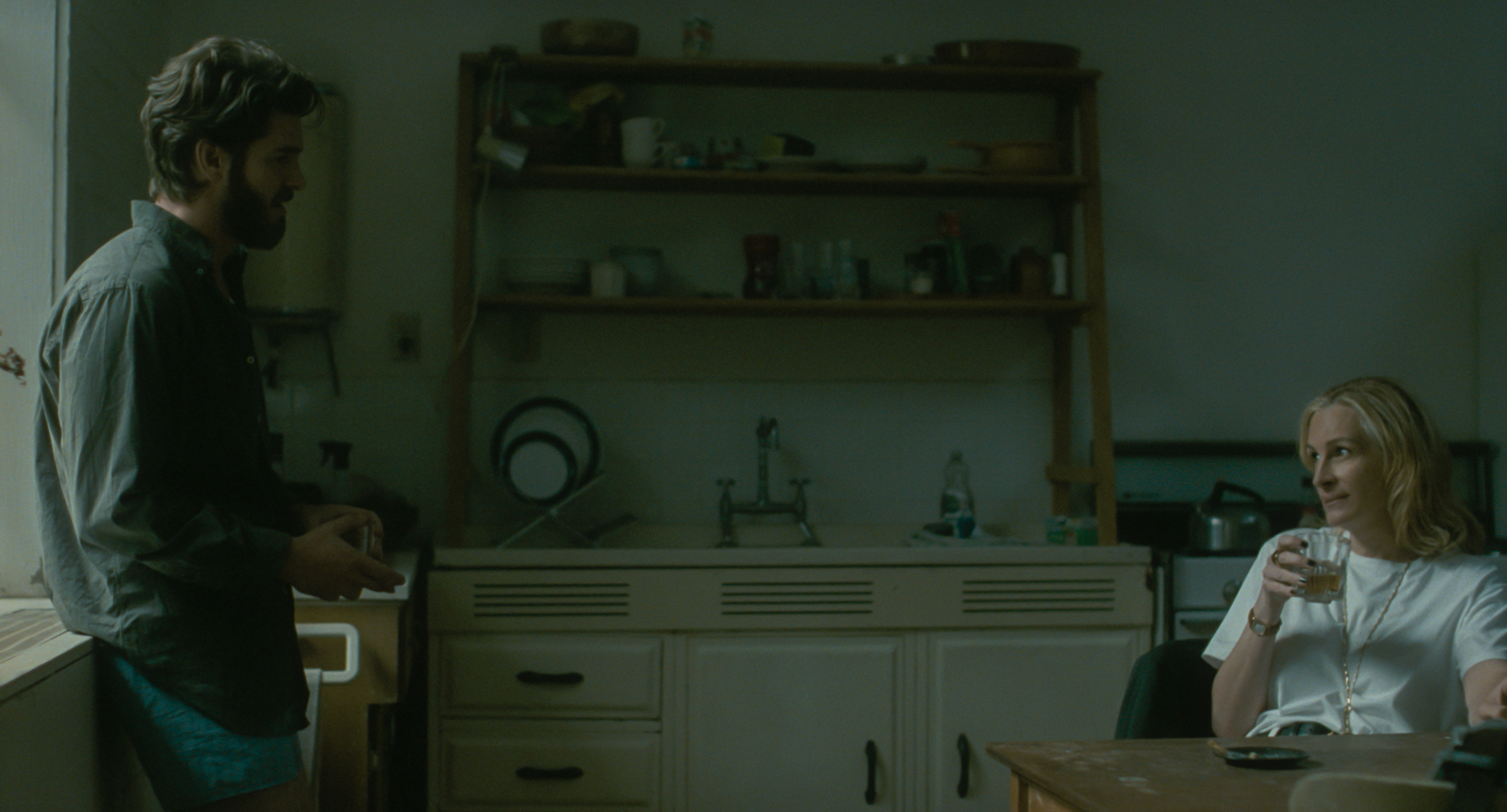
Hank (Andrew Garfield) and Alma (Roberts) as they reflect upon their relationship in her apartment.
MC: After the Hunt isn’t the only movie about the fallout of a campus assault that’s come out this year. Sorry, Baby is about a similar story. Why do you think we still need these stories, and how are the narratives surrounding them continuing to change?
NG: I did see Sorry, Baby, and I loved it. Eva Victor is a really fantastic voice and storyteller and performer. They had a really beautiful quote that I remember reading where they said something like, “You put these stories out there and you kind of hope no one will resonate with them, because obviously nobody wants these experiences for other people, but then people do resonate with them.” There's a relief in the resonance of, I'm not alone in this, and there's also a deep grieving for the fact that you're not alone in this.
My favorite books, films, plays, television are always about, Oh, I'm not alone in this, or helping me feel something that perhaps I hadn't given myself permission to feel. I think that as long as we need to keep having those resonant experiences, we'll keep talking about stories like this, because I feel like there can be such isolation and shame and anger and bevy of really internal facing emotions and in stories like this that I think when faced with recognition and understanding and compassion have the opportunity for the beginnings of a certain type of healing. That’s necessary, even as you hope that eventually these types of stories don't occur. Saying something like that feels a little bit naïve, but perhaps it's nice to be a little bit naïve, if it means also being hopeful.
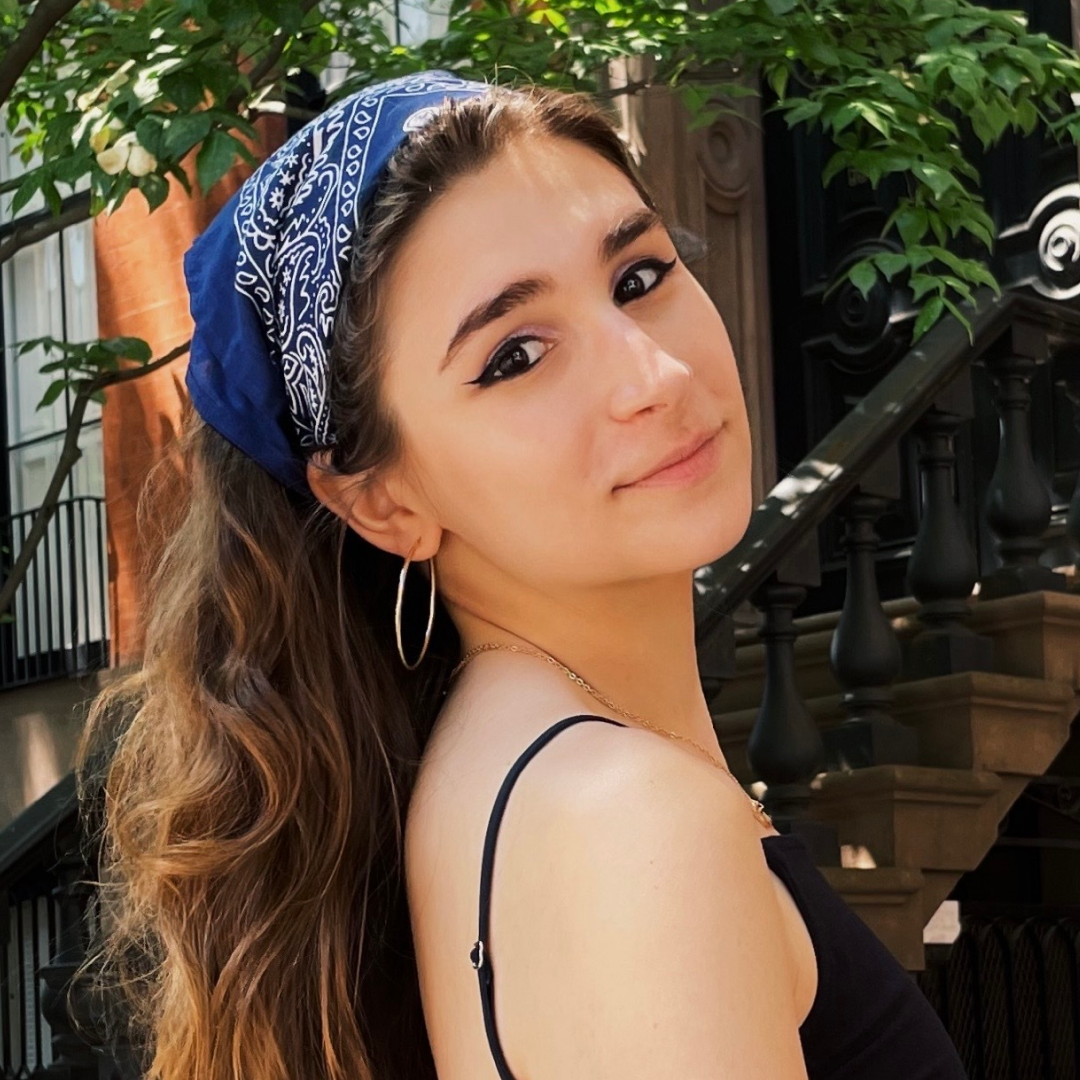
Sadie Bell is the Senior Culture Editor at Marie Claire, where she edits, writes, and helps to ideate stories across movies, TV, books, music, and theater, from interviews with talent to pop culture features and trend stories. She has a passion for uplifting rising stars, and a special interest in cult-classic movies, emerging arts scenes, and music. She has over nine years of experience covering pop culture and her byline has appeared in Billboard, Interview Magazine, NYLON, PEOPLE, Rolling Stone, Thrillist and other outlets.